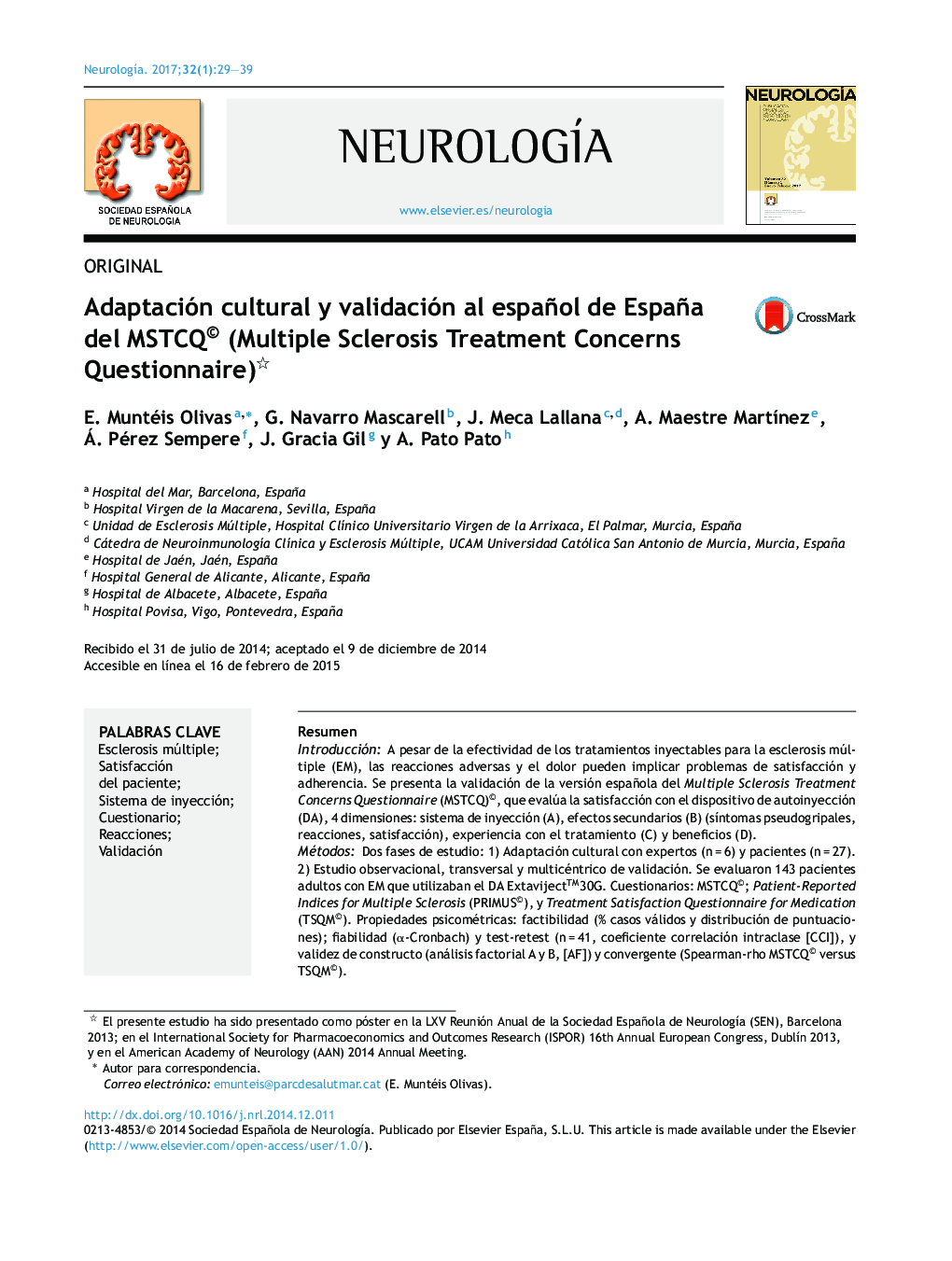| Article ID | Journal | Published Year | Pages | File Type |
|---|---|---|---|---|
| 5631766 | Neurología | 2017 | 11 Pages |
ResumenIntroducciónA pesar de la efectividad de los tratamientos inyectables para la esclerosis múltiple (EM), las reacciones adversas y el dolor pueden implicar problemas de satisfacción y adherencia. Se presenta la validación de la versión española del Multiple Sclerosis Treatment Concerns Questionnaire (MSTCQ)©, que evalúa la satisfacción con el dispositivo de autoinyección (DA), 4 dimensiones: sistema de inyección (A), efectos secundarios (B) (sÃntomas pseudogripales, reacciones, satisfacción), experiencia con el tratamiento (C) y beneficios (D).MétodosDos fases de estudio: 1) Adaptación cultural con expertos (n = 6) y pacientes (n = 27). 2) Estudio observacional, transversal y multicéntrico de validación. Se evaluaron 143 pacientes adultos con EM que utilizaban el DA Extavijectâ¢30G. Cuestionarios: MSTCQ©; Patient-Reported Indices for Multiple Sclerosis (PRIMUS©), y Treatment Satisfaction Questionnaire for Medication (TSQM©). Propiedades psicométricas: factibilidad (% casos válidos y distribución de puntuaciones); fiabilidad (α-Cronbach) y test-retest (n = 41, coeficiente correlación intraclase [CCI]), y validez de constructo (análisis factorial A y B, [AF]) y convergente (Spearman-rho MSTCQ© versus TSQM©).ResultadosEdad media (DT) 41,94 (10,47) años, 63% mujeres, 88,11% con EM remitente-recurrente, media (DT) EDSS 2,68 (1,82) puntos. Alta cumplimentación del MSTCQ© (perdidos 0-2,80%). Alta consistencia interna: puntuación total (A + B) α = 0,89, por dimensiones (A, B y C) α = 0,76, 0,89 y 0,92, respectivamente. Excelente concordancia test-retest en las puntuación total (CCI = 0,98), por dimensiones (A, B y C) CCI = 0,82, 0,97 y 0,89, respectivamente. El AF corroboró la estructura interna del cuestionario original. Correlación moderada (Rho = 0,42-0,74) y significativa (p < 0,05 y p < 0,01) entre las puntuación total y por dimensiones del MSTCQ© y el TSQM©.ConclusionesSe constatan adecuadas propiedades psicométricas de la versión española del MSTCQ©.
IntroductionAlthough subcutaneous treatments for multiple sclerosis (MS) have been shown to be effective, adverse reactions and pain may adversely affect treatment satisfaction and adherence. This study presents an adapted and validated Spanish version of the Multiple Sclerosis Treatment Concerns Questionnaire© (MSTCQ), which evaluates satisfaction with the injection device (ID) across 4 domains: injection system (A), side effects (B) (flu-like symptoms, reactions, and satisfaction), experience with treatment (C) and benefits (D).MethodsTwo study phases: 1) Cultural adaptation process with input from experts (n = 6) and patients (n = 30). 2) Validation obtained by means of an observational, cross-sectional, multi-centre study evaluating 143 adult MS patients using an ID. Tools employed: MSTCQ©, Patient-Reported Indices for Multiple Sclerosis (PRIMUS©), and Treatment Satisfaction Questionnaire for Medication (TSQM©). Psychometric properties: Feasibility (percentage of valid cases and floor/ceiling effects); Reliability (Cronbach α) and test-retest correlation (n = 41, intraclass correlation coefficient, ICC); and construct validity (factor analysis of domains A and B) and convergent validity (Spearman rank-order correlation for MSTCQ© vs TSQM©).ResultsMean age (SD) was 41.94 (10.47) years, 63% of the group were women, and 88.11% presented relapsing-remitting MS. Mean (SD) EDSS score was 2.68 (1.82) points. MSTCQ© completion was high (0%-2.80% missing data). Internal consistency was high at α = 0.89 for the total score (A + B) and α = 0.76, 0.89, and 0.92 for domains A, B, and C, respectively. The version demonstrated excellent test-retest reliability for the total (ICC = 0.98) and for domains A, B, and C: ICC = 0.82, 0.97, and 0.89, respectively. Factor analysis corroborated the internal structure of the original questionnaire. The association between total and domain scores on both the MSTCQ© and the TSQM© was moderately strong (Rho = 0.42-0.74) and significant (P < .05 and P < .01).ConclusionThe Spanish version of MSTCQ© demonstrates appropriate psychometric properties.
